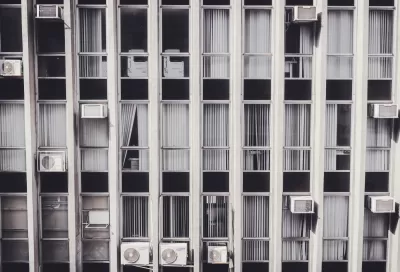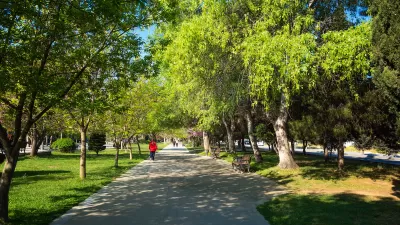Air conditioning has drastically changed modern life and the ways cities have developed. But, the environmental consequences are immense, and it’s time to cut back.

"Buying an air conditioner is perhaps the most popular individual response to climate change, and air conditioners are almost uniquely power-hungry appliances: a small unit cooling a single room, on average, consumes more power than running four fridges, while a central unit cooling an average house uses more power than 15," writes Stephen Buranyi in a feature piece that traces the history of air conditioning.
There are more than 1 billion single-room air conditioning units in the world today, and that number is expected to rise to 4.5 billion by 2050. But air conditioning was not always the norm, says Buranyi. Before the late 1940s, it was a novelty, but then it took off in the United States as builders and architects looked to put homes in inhospitable climates and energy companies worked to increase consumer demand.
Since then, air conditioning has helped fuel urbanism and the rise of cities around the world as part of the spread of globalization. Solutions to addressing the use of air conditioning include improving the technology, reclaiming design strategies that worked before air conditioning was available, and changing the perception that it is a necessity. "Cutting down on air conditioning doesn’t mean leaving modernity behind, but it does require facing up to some of its consequences," notes Buranyi.
FULL STORY: The air conditioning trap: how cold air is heating the world

Maui's Vacation Rental Debate Turns Ugly
Verbal attacks, misinformation campaigns and fistfights plague a high-stakes debate to convert thousands of vacation rentals into long-term housing.

Planetizen Federal Action Tracker
A weekly monitor of how Trump’s orders and actions are impacting planners and planning in America.

In Urban Planning, AI Prompting Could be the New Design Thinking
Creativity has long been key to great urban design. What if we see AI as our new creative partner?

King County Supportive Housing Program Offers Hope for Unhoused Residents
The county is taking a ‘Housing First’ approach that prioritizes getting people into housing, then offering wraparound supportive services.

Researchers Use AI to Get Clearer Picture of US Housing
Analysts are using artificial intelligence to supercharge their research by allowing them to comb through data faster. Though these AI tools can be error prone, they save time and housing researchers are optimistic about the future.

Making Shared Micromobility More Inclusive
Cities and shared mobility system operators can do more to include people with disabilities in planning and operations, per a new report.
Urban Design for Planners 1: Software Tools
This six-course series explores essential urban design concepts using open source software and equips planners with the tools they need to participate fully in the urban design process.
Planning for Universal Design
Learn the tools for implementing Universal Design in planning regulations.
planning NEXT
Appalachian Highlands Housing Partners
Mpact (founded as Rail~Volution)
City of Camden Redevelopment Agency
City of Astoria
City of Portland
City of Laramie





























